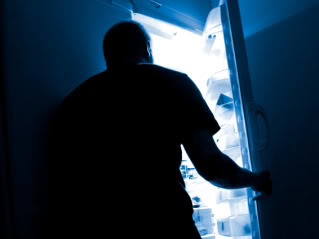- Calls to this hotline are currently being directed to Within Health, Fay or Eating Disorder Solutions
- Representatives are standing by 24/7 to help answer your questions
- All calls are confidential and HIPAA compliant
- There is no obligation or cost to call
- Eating Disorder Hope does not receive any commissions or fees dependent upon which provider you select
- Additional treatment providers are located on our directory or samhsa.gov
Causes Related to Night Eating Syndrome

Contributor: Crystal Karges, MS, RDN, IBCLC, Special Projects Coordinator at Eating Disorder Hope/Addiction Hope
Eating disorders are complex psychiatric illnesses with strong biological influences, and while many people have heard of some of the more common eating disorders, including binge eating disorder, bulimia nervosa and anorexia nervosa, the wide spectrum of eating disorders are lesser known and understood.
Night eating syndrome is included in the category of eating disorders, and better understanding this eating disorder can create greater awareness of this illness that many people might be struggling with.
Understanding Night Eating Syndrome
Night eating syndrome is an eating disorder that is defined by a delayed circadian pattern of food intake. Many people may assume that night eating syndrome is associated with binging or eating abnormal quantities of food at night, however, many individuals who struggle with night eating syndrome are not necessarily experiencing a loss of control over their food intake.
With night eating syndrome, a person will tend to consume twenty-five percent or more of their total daily calories after an evening meal in addition to experiencing substantial urges to eat in the evening/at night.
Other symptoms of night eating syndrome include having the belief that eating is necessary to fall back asleep at night, experiencing difficulty sleeping without eating, and lack of morning hunger. Mood disorders, such as depression, may occur alongside night eating syndrome as well.
Investigating Causes of Night Eating Syndrome
As with all eating disorders, a single factor cannot be pinpointed as the cause of night eating syndrome. Research has demonstrated that eating disorders are influenced by a variety of factors, including biological and environmental components.
 Understanding this fact can often be relieving for a person who is suffering from an eating disorder, like night eating syndrome, as it often brings greater clarity to a complex issue. Eating disorders are not diseases that people choose to have willingly, and night eating syndrome cannot be simplified as a lack of self-control.
Understanding this fact can often be relieving for a person who is suffering from an eating disorder, like night eating syndrome, as it often brings greater clarity to a complex issue. Eating disorders are not diseases that people choose to have willingly, and night eating syndrome cannot be simplified as a lack of self-control.
There is often much shame associated with eating disorders such as night eating syndrome, as many people may not understand the reasons why they are struggling with these habits. It is crucial to move beyond this to reach a point of being able to ask for professional help, which is often necessary for recovering from and healing from night eating syndrome.
A professional who specializes in this area can help a person better understand what factors may be influencing their eating disorder as well as advise comprehensive treatment for recovery.
Community Discussion – Share your thoughts here!
What do you think are some of the common misconceptions about night eating syndrome?
 About the Author: Crystal is a Masters-level Registered Dietitian Nutritionist (RDN) with a specialty focus in eating disorders, maternal/child health and wellness, and intuitive eating. Combining clinical experience with a love of social media and writing, Crystal serves as the Special Projects Coordinator for Eating Disorder Hope/Addiction Hope, where her passion to help others find recovery and healing is integrated into each part of her work.
About the Author: Crystal is a Masters-level Registered Dietitian Nutritionist (RDN) with a specialty focus in eating disorders, maternal/child health and wellness, and intuitive eating. Combining clinical experience with a love of social media and writing, Crystal serves as the Special Projects Coordinator for Eating Disorder Hope/Addiction Hope, where her passion to help others find recovery and healing is integrated into each part of her work.
As a Certified Intuitive Eating Counselor, Crystal has dedicated her career to helping others establish a healthy relationship with food and body through her work with EDH/AH and nutrition private practice.
The opinions and views of our guest contributors are shared to provide a broad perspective of eating disorders. These are not necessarily the views of Eating Disorder Hope, but an effort to offer discussion of various issues by different concerned individuals.
We at Eating Disorder Hope understand that eating disorders result from a combination of environmental and genetic factors. If you or a loved one are suffering from an eating disorder, please know that there is hope for you, and seek immediate professional help.
Last Updated & Reviewed By: Jacquelyn Ekern, MS, LPC on February 18, 2016
Published on EatingDisorderHope.com

The EatingDisorderHope.com editorial team comprises experienced writers, editors, and medical reviewers specializing in eating disorders, treatment, and mental and behavioral health.

